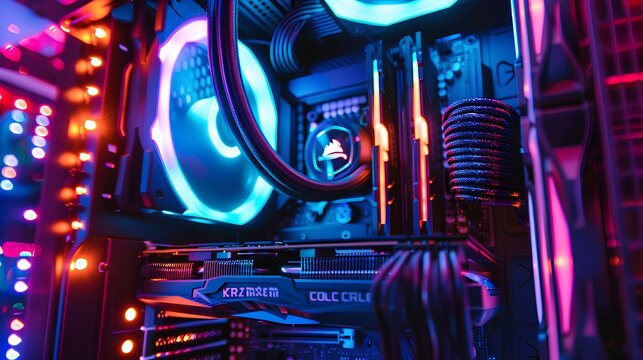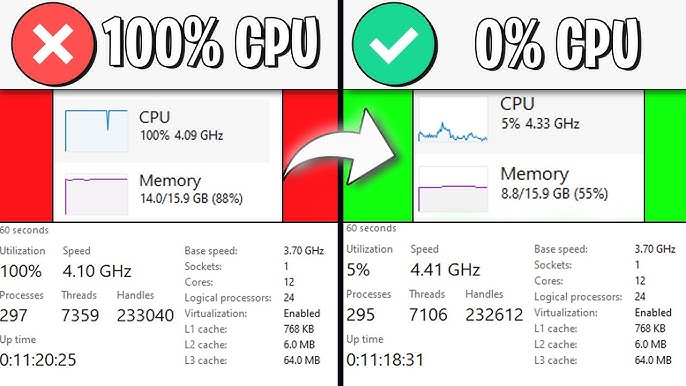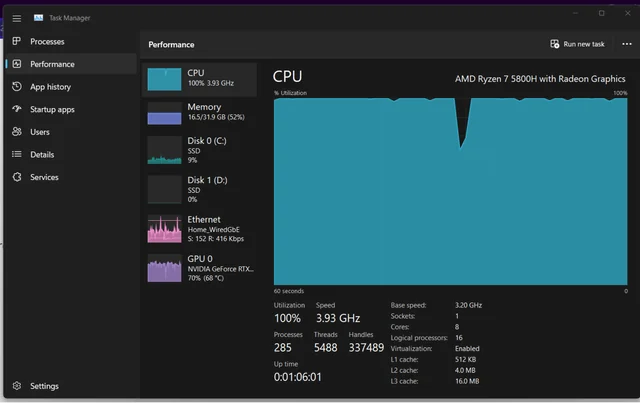CPU-heavy settings in games are options that use a lot of your computer’s processing power. These settings can make your games look better but may slow down your system.
CPU heavy settings in games use a lot of your computer’s processing power. Features like high AI complexity, many objects, or detailed physics can slow down your game. Lowering these settings can help your game run smoother.
In this article, we will discuss “CPU heavy settings in games”.
Understand The CPU:
What Are CPU Heavy Settings In Games?
CPU Heavy settings in games are options that use a lot of your computer’s processing power. These include shadows, lighting, AI, and physics effects. These settings can make games look better but may slow down your computer.
How Do Games Use The CPU?
Games use the CPU to handle tasks like controlling game characters, managing physics, and processing actions. The CPU helps run the game smoothly by calculating what happens in the game world and responding to player inputs.

Read: Where Is The CPU Stored – A Complete Guide Of 2024!
What Makes Some Game Settings Hard On The CPU?
Some game settings are hard on the CPU because they require a lot of calculations. These include detailed graphics, complex AI, realistic physics, and high draw distances. All these tasks make the CPU work harder and can slow down the game.
What Are Common CPU Heavy Settings In Games?
Common CPU-heavy settings in games include high shadows, detailed lighting, complex physics, advanced AI, and large draw distances. These settings require a lot of processing power from the CPU, which can slow down your computer.
How To Do Game AI, Shadows, And Draw Distance Impact The CPU?
Game AI, shadows, and draw distance impact the CPU by making it work harder. AI controls character actions, shadows add depth, and draw distance loads more of the game world. All these tasks need extra processing power, slowing down the CPU.
How Do Physics And Particle Effects Affect The CPU?

Physics Effects:
Physics calculations, like object collisions and movement, need a lot of CPU power to make the game look realistic.
Particle Effects:
Particle effects, like explosions and smoke, require extra processing to create and animate small details.
Increased Load:
Both physics and particle effects increase the CPU load, which can slow down your computer.
Performance Impact:
More complex physics and particle effects can reduce game performance and frame rates.
How Can You Keep Good Graphics While Using Less CPU Power?
To keep good graphics while using less CPU power, lower settings for shadows, details, and physics. Adjust draw distance and particle effects to balance performance and visuals, ensuring the game looks good without overloading your CPU.

Which Graphics Settings Rely Most On CPU Power?
Graphics settings that rely most on CPU power include shadows, lighting, physics, and AI. These settings need a lot of processing to manage details and actions, making your CPU work harder and potentially slowing down your game.
Read: What Is CPU Graphics Called? – Comprehensive Guide Of 2024!
What Role Does Game AI Play In CPU Load?
Game AI uses the CPU to control how characters and enemies act. More complex AI requires more processing power, increasing the CPU load and potentially slowing down your game.
How Can I Reduce CPU Load While Gaming?
To reduce CPU load while gaming, lower settings like shadows, detail levels, and AI. You can also close background programs to free up CPU power and improve game performance.
Can I Get Good Graphics Without Overloading My CPU?
Yes, you can get good graphics without overloading your CPU by adjusting settings. Lower shadows, details, and physics while keeping key graphics features high to balance quality and performance.
Which Game Settings Are CPU Heavy?
CPU-heavy game settings include high shadows, detailed lighting, complex physics, and advanced AI. These settings use a lot of processing power, which can slow down your computer.
Is 100% CPU Usage While Gaming Bad?
Yes, 100% CPU usage while gaming is usually bad. It means your CPU is working at full capacity, which can cause slower performance, overheating, and potential damage to your computer.
Read: Can A CPU Die From Overheating – Ultimate Guide For 2024!
Is 100% CPU Usage A Bottleneck?
Yes, 100% CPU usage can be a bottleneck. It means the CPU is working at full capacity, which can slow down your game and limit overall computer performance.
Is 80% CPU Usage Ok?
Yes, 80% CPU usage is usually OK. It means your CPU is working hard but not at full capacity. Just make sure your computer stays cool and performs well during gaming.
What Is A Bad CPU Usage Percentage?
A bad CPU usage percentage is close to 100%. It means your CPU is fully used, which can cause slow performance, overheating, and potential damage to your computer.
What Should CPU Usage Be In The Game?
In a game, CPU usage should ideally be between 50% and 80%. This range helps ensure good performance without overloading the CPU, allowing smooth gameplay and avoiding potential issues.
When PC Gaming, What Graphic Settings Affect The CPU Or GPU More?
In PC gaming, settings like view distance, shadows, and physics use more CPU power. Graphics details like textures, resolution, and anti-aliasing use more GPU power. Lowering CPU-heavy settings can improve game speed while lowering GPU-heavy settings can help if your graphics card is struggling.
Do Games In General Become More CPU Bound If I Play At Lower Settings Or Lower Screen Resolution?
Yes, games can become more CPU-bound at lower settings or screen resolutions. This is because the graphics card has less work to do, so the CPU handles more tasks, like game physics or AI. Balancing settings is important to avoid overloading the CPU while maintaining good performance.
How Do I Force A Game To Use More GPU And CPU?
To make a game use more GPU and CPU, set the game to high graphics settings, turn on all effects, and increase the resolution. Also, close other programs to free up resources. This way, your computer focuses more power on the game, improving performance.
What Graphical Settings Affect CPU The Most?
Settings that affect the CPU most include draw distance, shadows, and the number of active characters or objects. These features require more processing power to handle, which can slow down the game. Lowering these settings can help the game run smoother, especially on computers with less powerful CPUs.
Where Should CPU Usage Percentages And GPU Usage Percentages Be At During Gaming?
During gaming, CPU usage should ideally be between 40% to 70%, while GPU usage should be close to 100% for the best performance. If the CPU is too high, it might slow things down. Balancing both helps ensure smooth and enjoyable gameplay.
Why Is My CPU Spiking When I Play Games?
Your CPU may spike when playing games due to high settings, background programs, or overheating. These factors cause the CPU to work harder, leading to sudden increases in usage.

Read: What Provides The Best Cooling To The CPU – Best Cooling Picks 2024!
Frequently Ask Questions:
1. How Can I Tell If A Game Is Using Too Much CPU?
Check your CPU usage in Task Manager. If it’s near 100% during gameplay, the game may be using too much CPU.
2. Do High-Resolution Textures Affect CPU Usage?
No, high-resolution textures mostly use the GPU. CPU-heavy settings like AI and physics have a bigger impact on CPU usage.
3. Can Adding Mods Increase CPU Usage In Games?
Yes, mods that add new features or complex graphics can increase CPU usage, depending on what they do.
4. What Happens If My CPU Is Overloaded While Gaming?
If your CPU is overloaded, the game may lag, stutter, or crash, and your computer might overheat.
5. Should I Upgrade My CPU For Better Game Performance?
Yes, you should upgrade your CPU if it’s old or struggling with new games, as it can improve performance.
6. How Do I Check Which Game Settings Use More CPU?
Monitor your CPU usage while adjusting settings. Settings that cause higher CPU usage will show a noticeable increase in the CPU load.
7. Is It Better To Lower Game Settings For A Smoother Experience?
Yes, lowering settings that impact CPU usage can help improve performance and reduce lag or stutter.
8. Do Background Applications Affect CPU Usage During Gaming?
Yes, background applications use CPU resources, so closing unnecessary programs can help your game run smoother.
9. How Can I Reduce CPU Load Without Lowering Graphics Quality?
Adjust settings like AI complexity and physics detail. You can also close other applications to free up CPU power.
10. Can Overclocking My CPU Help With Game Performance?
Yes, overclocking can boost game performance, but it may cause overheating. Ensure your cooling system is strong enough.
Conclusion:
In conclusion, CPU-heavy settings in games can greatly impact your computer’s performance. By understanding which settings use the most CPU power, like shadows, AI, and physics, you can adjust them to improve gameplay. Balancing graphics quality and CPU load is key to smoother gaming without overheating or slowing down your system.
Related Posts:
- CPU Machine Check Architecture Error Dump – Fix Hardware Issues!
- Why Is My CPU Overclocking Itself – Optimize Your Performance!
- CPU Usage Drops When I Open Task Manager – Optimize Your Performance!
- Why Does My CPU Fan Start And Stop – Check Fan Settings!
